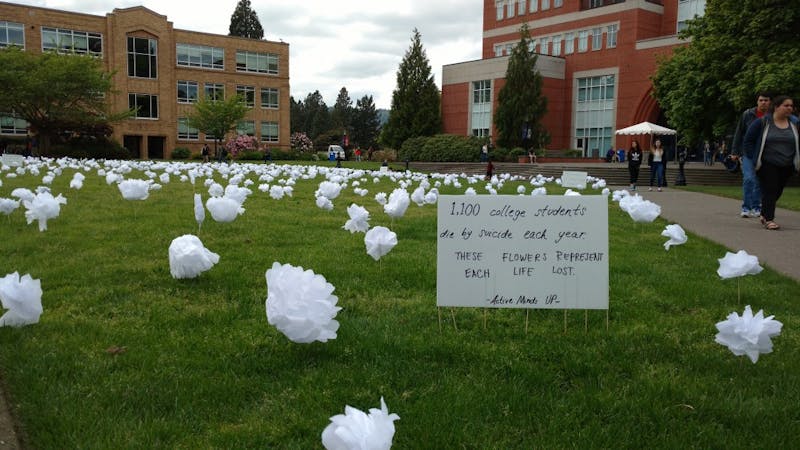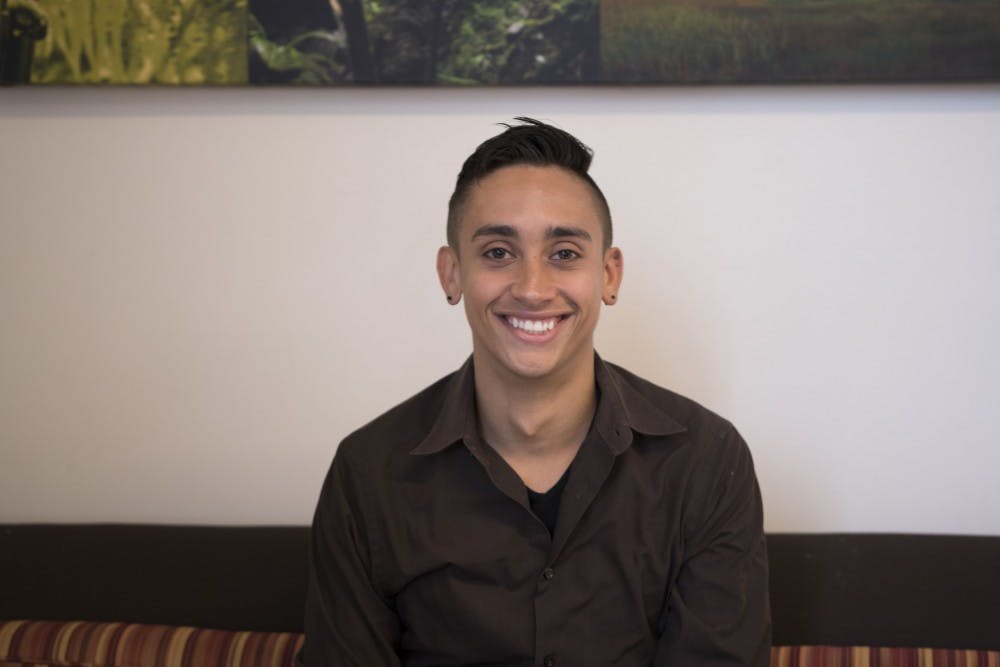Jesse Dunn was one of the few people still awake at 2 a.m. when his friend posted a suicide note on Facebook.
Not missing a beat despite the early hour, Dunn met Logan Crabtree and several other friends next door to his friend’s apartment in Tyson. It wasn’t long before they decided they had to go looking for him.
Cathedral Park is eerie late at night. But Dunn and Crabtree searched the grounds, checking the bridge and walking along the train tracks in an attempt to find the place, any logical place they thought their friend might have gone intending to harm himself. For nearly four hours, the duo combed through the park.
The sun was peeking up when they got word from police that their friend’s phone had been located heading east toward Bend. All they could do was go home and try to sleep.
Just an hour and a half later, Dunn woke up to a call from Crabtree. Their friend was dead.
“My whole body was completely cold, like I went into shock almost,” Dunn said. “I remember just being so cold, physically cold, and I could not get warm. I had so many blankets on me but I could just not get warm. And then I took a hot shower and cried.”
That friend was Michael Eberitzch, a UP student whose death in March 2015, with Dunn’s help, initiated a campus-wide conversation on suicide and mental health.
Now, Dunn tells this story over coffee in The Commons — easing back against the fireplace and breaking the surface of the foam on his latte. He is not the kind of person you have to slowly drag the truth out of. He has no qualms about sharing who he is and where he’s been.
His openness is something the senior psychology major has come to be known for on campus. And it’s made him a walking example of his philosophy on fighting the stigma that surrounds issues of mental health: “I’d like to get to the point where we can talk about feeling anxious today in the same way that we talk about the fact that we have a headache today,” he says.
Dunn has made huge strides in improving the UP community’s understanding of mental health over the last year through Active Minds, a mental health awareness and advocacy group. Last month, he received the National Depression on College Campuses Conference national award for exceptional mental health advocacy for students. He and Active Minds Co-President Crabtree also received the Rev. John van Wolvlear, C.S.C. Award from the Office of Student Affairs for their outstanding involvement in student life. Although Dunn encourages struggling students to get professional counseling through the Health Center, he’s acted as what he calls a “quasi-therapist” for his peers facing personal challenges.
And while that added responsibility weighs on him at times, for the most part, Dunn doesn’t mind. In fact, he says it’s allowed him to practice for his future career as a counselor. That, and he can relate.
Dunn’s challenges with mental health started in the eighth grade — a drug and alcohol addiction that came to a head his first semester at UP. This start of his college experience, at first glance, wasn’t atypical. Drinking, smoking, partying and reveling in the newfound freedom that college brings all created a semblance of “fun.” But Dunn wasn’t free. He was tortured.
On top of everything, his dad was dying of Huntington’s Disease, which he’d been fighting for most of Dunn’s life.
In some ways, Dunn says his family in Christie Hall, headed by “father figure” hall director Joe Burke, saved him during that first semester. And they taught him the value of community in overcoming personal challenges, a lesson Burke said he’s seen Dunn internalize throughout his time at UP.
“In all the years that I’ve known him, (Dunn) has got an intense desire for self-discovery and really clear way of reflecting on who he is and how he can do better, and how he can help live for others,” Burke said. “He has an intense desire to live his life for the benefit of others. That’s one thing that I think really has shaped his own personal philosophy and own personal life, and shaped his philosophy in active minds as well.”
Dunn took the second semester of freshman year off to go home and get sober, and returned to campus which was a test of his commitment to sobriety.
“It was really hard, I made an unwise decision to keep living with people, who were great people, but who I knew partied,” Dunn said. “It was like grinding my teeth, white-knuckling it through that first year. It was challenging but also, in retrospect, I haven’t had any close calls since that first year ... so it definitely made me stronger in my sobriety.”
It also made him realize the importance of focusing on his mental health.
“I’m an alcoholic, a drug addict, and I pushed away all of my mental health stuff when I was going through that,” Dunn said. “I realized after that that the reason I abused substances in the way that I did was because I didn’t want to deal with my mental health issues. It made me understand that mental health is something that really often gets shoved underneath other shit and masked by shit. So after getting sober I realized how important it is to be introspective and honest with yourself, and how important it is to prioritize your mental health.”
This priority was a personal one for Dunn to start, he started rock climbing and meditating regularly to focus on his anxieties rather than distracting himself from them.
“I like climbing in that it’s not a competitive sport, those stress me out too much,” Dunn said. “Climbing is really fun in that it’s just for me.”
Senior Hannah Thorson, Dunn’s friend who introduced him to climbing, says the kind of unguarded honesty with which he shares his story is typical for Dunn.
“He’s like that in every aspect of his life,” Thorson said. “He’s a full-transparency kind of guy, he’ll tell you everything that’s on his mind.”

After Eberitzch’s death, Dunn realized he couldn’t keep the lessons he’d learned about mental health to himself. His friend since freshman year of college, Eberitzch was someone Dunn knew wouldn’t have wanted to talk about the fact that he had a problem, and when it seemed like the UP administration didn’t want to talk about it either, that hit a nerve.
Dunn and ‘15 graduate Joe Shorma wrote an impassioned letter to The Beacon, emphasizing the need to openly acknowledge the mental illness that led to Eberitzch’s death.
The letter reads, “At (Erberitzch’s memorial) service, Father Mark DeMott said that, ‘We will never know exactly what happened in the middle of the night on Highway 26.’ The two of us have been confused and frustrated by the school’s response to Mike’s death. In what could have been a perfect opportunity to have an open dialogue about the risks and consequences of depression, our University has opted to sweep it under the rug.”
Dunn, Shorma and Crabtree — the founding members of Active Minds — knew that something had to be done.
“We started off as a group of really just three pissed off students with no plan,” Dunn said. “We just wanted to kind of express our disapproval with the fact that UP wasn’t having open conversations about suicide and mental health.”
But they channeled their frustrated energy into productive action, setting up meetings with administrators who were more invested in student mental health than the three had initially assumed.
And Dunn says it was a push from Br. Tom Giumenta, now Active Minds’ faculty adviser, that finally encouraged them to harness their power as students to create a formal group dedicated to making change.
“It was important for them ... rather than emphasize any possible mistakes of others that may or may not have been made, to really try to think about what’s really going on with you personally as an individual human being, and what can you bring to the table to make something positive for other members of the community,” Giumenta said. “I think it really speaks to (Dunn’s) personality, his character and really his self-discipline. To choose positive over negative really requires self-discipline.”
Since its official outset last fall, UP’s branch of Active Minds, a national organization dedicated to awareness advocacy for mental health, has grown to a steady average of nearly 40 participants attending its monthly meetings. They have had countless pieces aimed at de-stigmatizing mental health published in The Beacon and had a high level of consistent engagement enjoyed by few student clubs on campus.
“From the get-go, there have been so many people who want to be involved, and I think that really just speaks to the topic at hand,” Dunn said. “Everyone is affected by mental health in one way or another. I think it’s interesting, too, because I think people realize that even if they’re not going through stuff, even if they’re not going through hard stuff, there’s lessons to be learned about how to thrive because we have this image of mental health that it can only go wrong, but in reality, people want to know about how they can make themselves really good in terms of their mental health.”
And this gets at Dunn’s ultimate goal, as well as the mission of Active Minds: To eradicate the stigma associated with mental illness.
Dunn knows that he has his sights set high, perhaps so high that this goal won’t be attainable in the foreseeable future. But he believes UP has a long way to go in creating a culture where mental illness is not stigmatized and overall wellness on campus is supported.
He’d like to see a growing awareness that “mental health” doesn’t necessarily equate to “poor mental health” and that, in fact, one can care for their mental health as they would their physical health, which Dunn does through rock climbing and meditation. He’d like for the movement to extend beyond Active Minds, beyond the student body, and says he sees positive growth in this direction through administration’s ad hoc panel on mental health.
“If there’s one thing that I really hold to be true, it’s that people just need to love unconditionally,” Dunn said. “And I think that Active Minds, when embodying that principle, is going to be its most effective. And I think that when UP is really genuinely trying to embody that love for everyone, we’re going to be alright.”
Dunn takes one last swig of his coffee and heads off to give a presentation on the development of Active Minds this year for his capstone project — spreading the word about mental health, and spreading his love along the way.








